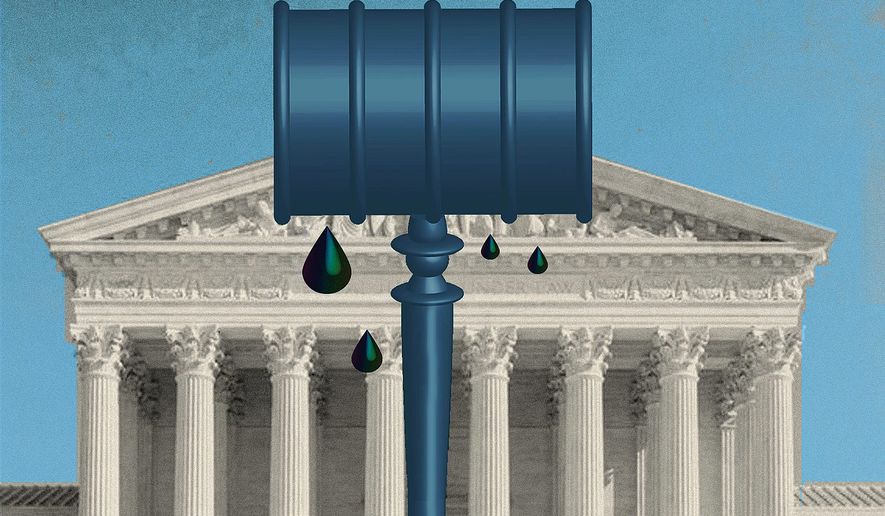OPINION:
To assume the role of the world’s premier energy leader, it’s not enough for the United States to simply have more oil and gas supplies than anyone else. Those products must also get to market. That means more pipelines, which also means more permits, and a consistent process that meets the needs of the market — and the environment.
Fortunately, a request from the Trump administration could help give confidence to the American pipeline construction industry that’s been stymied by judicial activism. The Department of Justice (DOJ) asked the U.S. Supreme Court on Monday to reverse a lower court’s ruling that, if left in place, could set back important pipeline projects significantly and give no confidence to future investments when our economy needs it the most.
In April, Judge Brian Morris of the U.S. District Court for the District of Montana sided with environmental activists by revoking critical water permits for the Keystone XL crude oil pipeline, a 1,200-mile project — whose first segment was completed this year — aimed at transporting Canadian crude oil to Nebraska and then along to American consumers. Judge Morris ruled that the U.S. Army Corps of Engineers failed, despite a full decade of study, to sufficiently address the endangered species potentially affected by the pipeline’s route.
But Judge Morris’ ruling doesn’t just affect Keystone XL. It also means that the U.S. Army Corps of Engineers now lacks the authority to authorize any pipeline construction activity under a program called Nationwide Permit 12. The program was meant to streamline the process of construction for pipelines, electric transmission lines and cables so that major utility projects with minimal environmental impact can be efficiently addressed. Keystone XL’s permits, for example, were approved by the Corps in 2017 under this authority.
Now, unless the Supreme Court reverses Judge Morris’ ruling, at least 70 oil and gas pipeline projects nationwide will come to a screeching halt while the Corps is forced to abandon Nationwide Permit 12 and undertake a lengthy review of its policies with regard to the Endangered Species Act. That will cost time, as well as money. One estimate projects that a delay of just one year will increase the cost of these projects by nearly 6% or close to $2 billion in total. Just as importantly, nearly 150,000 jobs will be held in the balance at a time when our nation needs to get back to work.
The DOJ has argued to Supreme Court justices that Judge Morris’ ruling on Nationwide Permit 12 dramatically overreaches his court’s authority. Unless reversed, DOJ officials argue, “the Corps would be unable to authorize dredge or fill activities for the construction of new oil or gas pipelines except through an expensive and time-consuming individual permitting process …” Again, at the expense of the American citizenry who need these projects to move forward.
The good news? The Supreme Court just days ago sided with the Trump administration by ruling that another major energy project, the Atlantic Coast Pipeline, could move forward under a federal permit issued by the U.S. Forest Service.
In a 7-2 ruling written by Justice Clarence Thomas, justices reversed a lower court ruling that had blocked a permit for the pipeline project that would transport natural gas from West Virginia to quickly developing markets in Virginia and North Carolina. The ruling affirms that the U.S. Forest Service can grant rights-of-way for projects that cross national forests, possibly foreshadowing its position on the authority of the Army Corps to grant similar permits when energy projects cross American waters.
Hopefully, the justices will allow Corps professionals the authority to once again make informed judgments based on science and evidence by restoring Nationwide Permit 12. Not only are the non-partisan men and women of the Corps trained and equipped to do so, but their ability to permit utility projects such as pipelines is critical to American prosperity and energy security. Energy supplies are not enough. Oil and gas supplies also must be transported to customers through safe and efficient pipelines. And at a time when American must get back to work, this is no time for a process that lacks consistency.
For too long, activists have weaponized the courts to block critical infrastructure and fulfill their own agendas. Never has this been more true than with Keystone XL, whose progress has been slowed and befuddled for more than a decade by manipulation of the permitting and review process. In the coming days, the U.S. Supreme Court has a chance to do the right thing by reversing a ruling that Corps officials call “extremely disruptive” and “contrary to the public interest.”
Now is the time to unleash American energy, not gamble with it. By answering the president’s call to restore Nationwide Permit 12, justices have a chance to truly bolster our nation’s energy infrastructure and restore confidence in the process and those government professionals charged with its oversight.
• Tom Magness, a retired Army colonel, formerly served as a commander in the U.S. Army Corps of Engineers.




Please read our comment policy before commenting.